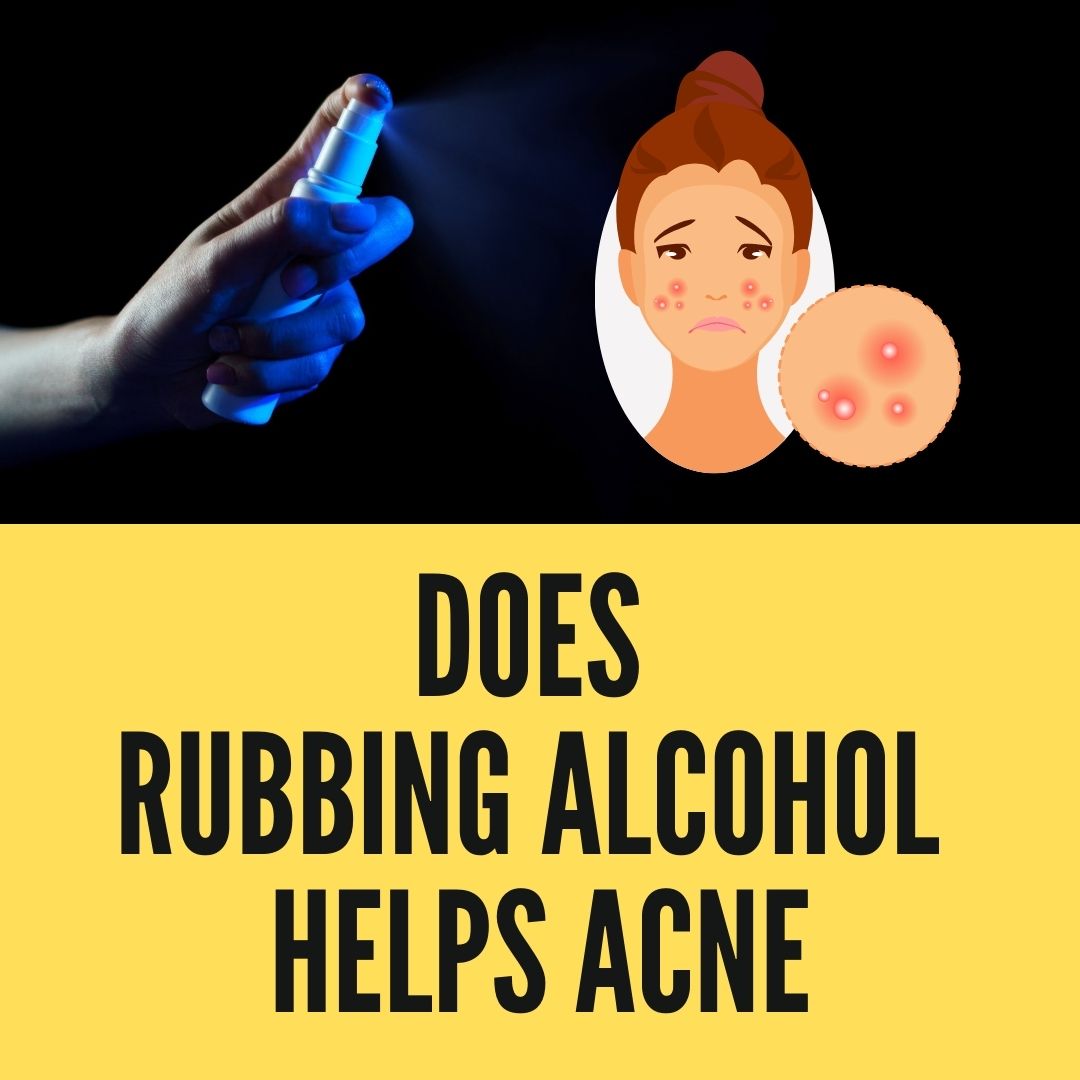
Having clear, spotless skin is a dream for many. Especially during the 20s, when Acne and pigmentation become extremely common, individuals keep trying one or another product and remedy.
Some of them suggest Aloe vera, while others swear by Turmeric. There is also a section of individuals who swear by Rubbing Alcohol for treating Acne. Though the concern is, “Is Rubbing Alcohol actually safe for putting on Acne”?
Here are all myths and facts about Rubbing Alcohol, its impact on Acne, and its usage on Facial Skin. Have a look:
Can Rubbing Alcohol Treat Acne? Can Rubbing Alcohol heal Acne?
Out of many home remedies and DIYs, Rubbing Alcohol is one of the most common for treating Acne, pimples, and pigmentation.
While the entire internet is discussing it, there aren’t many scientifically based pieces of evidence for the same.
Thus, before going into a Yes or No conclusion, let’s understand the bond between Rubbing Alcohol and Acne.
The Science-based explanation
Isopropyl or Rubbing Alcohol is purely an Alcoholic solvent. It comes in handy mainly for cleaning, disinfecting, and first aid usage.
The most basic properties of Rubbing Alcohol are its power of fighting bacteria and harmful microbes.
That is why, even on the professional front, one of the common usages of this solvent is cleaning wounds.
With the above explanation, it seems Rubbing Alcohol is safe for use on the skin. But is it really that safe?
Rubbing Alcohol due to its antibacterial and antimicrobial properties can prove helpful for treating Acne.
However, its benefits are only limited to inflammatory Acne, which is caused by bacteria called Propionibacterium Acnes.
These types of Acne consist of swelling, redness, pores clogged with oil, dead skin, and bacteria.
Inflamed Acne also consists of hard-to-get rid-of cysts, nodules, pustules, and papules.
For non-inflammatory Acne, Rubbing Alcohol Isn’t Effective.
Or, in simpler words, Acne, which isn’t caused by bacteria, they are not meant to be treated with Rubbing Alcohol either.
Blackheads and Whiteheads are common examples of non-inflammatory Acne.
Regardless of that, there are very minimal scientific proofs backing the benefits of Rubbing Alcohol on Acne or more cosmetic skin conditions.
Forgiving Isopropyl a complete green chit, more science, and cosmetic studies are essential.
Can I Use Rubbing Alcohol on my face for treating Acne?
Though science doesn’t fully support the thought, Rubbing Alcohol still can be used for Acne.
Especially when our cosmetic and makeup products are full of acids and chemicals, this solvent can also fit somewhere in between.
But that doesn’t mean that one can simply splash Isopropyl on their face.
Instead,
As lakhs of individuals across the world swear by Rubbing Alcohol for Acne, there must definitely be some good behind it.
But because Isopropyl (Rubbing) Alcohol is a strong chemical solvent, one should always start with a lower percentage.
If this solvent is new to your skincare vanity, then choose either 50% Isopropyl or 70% Isopropyl.
You can ask for a lower concentration at any drug store but remember, do not go with higher concentrations at all.
Now since Rubbing Alcohol has strong properties, always use it by diluting it with any carrier oil.
Tea tree oil, olive oil, and coconut oil are a few of the great carrier oils that are beneficial for Acne as well.
NOTE: Before you apply Rubbing Alcohol on your face, do perform a patch test. For that, dilute some lower concentration of Rubbing Alcohol and apply it near your underarms, only on a small area. Monitor for about a day on how it reacts. It might not do something miraculously good, but the concern here is it should also show any adverse effects. If there are no side effects (even irritation), you can proceed with the process below:
Some methods of using Rubbing Alcohol on Acne:
- To begin with, wash your face with any cleanser you normally use, and then let your skin dry. Either pat with a towel or let it air dry, as per your norms.
- Now take a glass bowl and mix carrier oil with 70% isopropyl alcohol (1:1). Keep the quantity of mixture according to the area (amount) of Acne on your face.
- Further, quickly take a cotton ball, dip it into the mixture and gently pat it around the pimples. Make sure you do not leave the mixture open for long, considering Isopropyl will take no time and evaporate.
Or,
- For being more precise, use earbuds instead of a cotton ball.
- Now let the Rubbing Alcohol and oil mixture dry and then follow up your regular skincare routine. However, because Rubbing Alcohol is a strong chemical, avoid using any other active chemicals or acids in your skincare regime. You can follow up with your moisturizer and sunscreen, though.
- Once your skin starts accepting Rubbing Alcohol, you can add it into your morning and night regime.
Later, you may start observing results within a week, ten days, or a little more time. The effects and results may vary on all skin types.
Does Rubbing Alcohol dry up pimples?
Yes, usage of Rubbing Alcohol will surely dry up the pimples. Alcohol as a solvent removes oil and thus leaves pimples dried down.
Can I Use Rubbing Alcohol on my face for oily skin?
For extremely oily skin, Rubbing Alcohol or Alcohol-based toners may help you.
Alcohol actually helps in reducing pore-clogging sebum. With extreme sebum production, skin becomes oily, waxy, and kind of greasy.
Too much sebum or oily skin can also lead to Acne. So, in case you have a combination of oily and acne-prone skin, you can use Rubbing Alcohol.
Does Rubbing Alcohol help cystic Acne?
Cystic Acne is a more severe and uncommon form of Acne. That is why, for treating them, instead of using Rubbing Alcohol, always refer to dermatologists.
The cystic Acne treatment involves prescription-strength topical creams, gels, and taking oral antibiotics.
Does Rubbing Alcohol get rid of blackheads?
No, Rubbing Alcohol does not work on blackheads, despite their effectiveness on pimples.
Blackheads and Whiteheads are both non-inflammatory Acne, and none of these are caused by bacteria.
And Isopropyl (Rubbing) Alcohol only works on bacteria-based Acnes.
Does Rubbing Alcohol have side effects on facial skin?
Even though Rubbing Alcohol is highly used for facial conditions, it can also result in several ill effects.
Some of the individuals may also suffer from,
Skin Redness, Dryness, Peeling, Itchiness, Flaking, and Pain.
Also, Rubbing Alcohol is not meant for long-term use. In the long run, it can play with the protective layer of your skin and worsen it further.
Thus, even if you are thinking of using Isopropyl for Acne, remember it is just a temporary way but not a cure.
If your Acne condition keeps repeating, all you need to do is see a dermatologist.
For Further Reading
- Can we use Isopropyl Alcohol spray for makeup?
- Can you put Rubbing Alcohol in Mascara?
- 13 Benefits of Rubbing Alcohol on the body
Wrapping up…
When it comes to skin, every individual is their own detective.
However, when your skin is experiencing conditions like Acne and pigmentation for a long time, you should consider seeing an expert.
We cannot deny the potential Acne fighting properties of Rubbing Alcohol; we also cannot deny its downsides.
Thus, avoid using solvents like Isopropyl on your face unless you aren’t sure about experimenting with your skin and facing the ill effects.

My name is Logan, and I’m a 36-year-old dad who owns a small pressure-washing company in the suburbs of Atlanta, Georgia. My main goal with rubbing-alcohol.com is to show you how versatile isopropyl rubbing alcohol can be! I hope. You find it useful.
